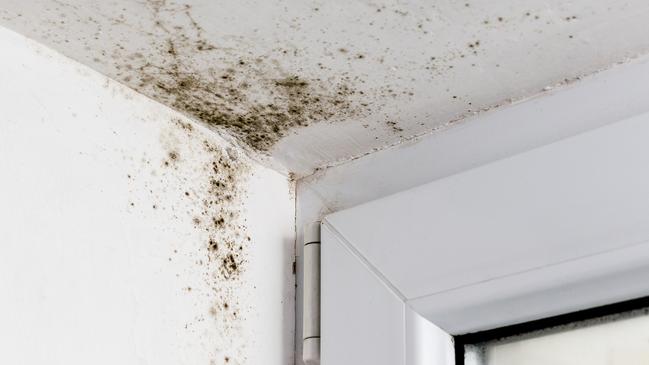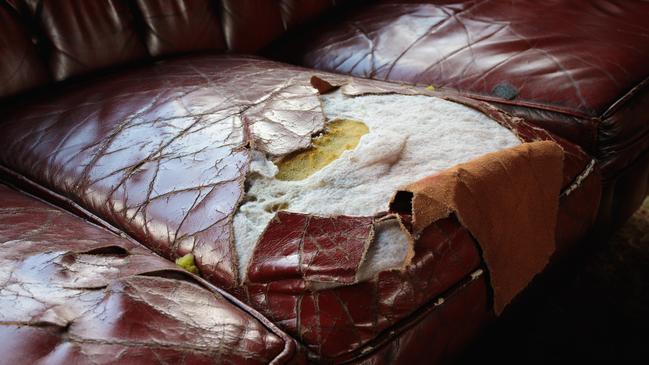Sisters In Law: What can I do if my house-sitter damages my home?
A NSW woman was shocked when, after being away for six weeks, she returned to find her house trashed, with her house-sitter claiming it was “wear and tear”.
Welcome to Sisters In Law, news.com.au’s weekly column solving all of your legal problems. This week, our resident lawyers and real-life sisters Alison and Jillian Barrett from Maurice Blackburn advise about your rights when it comes to damage occurring during house-sitting.
Question:
I went away recently and a friend of mine stayed in the house to look after my cat and dog. I have known her for around six months and thought I could trust her – but I was so wrong!
I was away for six weeks and she managed to wreck my place causing $10,000 worth of damage.
She wore high heels on my new wooden flooring causing hundreds of dents and scratches. I had told her not to wear shoes in the house.
She showered with the window closed so lots of mould formed in the bathroom and somehow, she also pulled a hole in the couch and I’ve got to buy a new one.
She was kind of apologetic when I came home but also said it was “wear and tear”. I would like to cover some of the damage. What are my rights? – Tanya, NSW

Answer:
Sounds like your trip away has turned into an expensive exercise Tanya, not to mention the strain this has no doubt placed on your friendship.
The first thing to determine is the nature of the relationship between you and your friend. Was she considered a guest, a tenant or a contracted pet-sitter?
To be decisive as to what category your relationship fits into we would need a lot more information, but we will give you some general advice to help you identify your rights.
We assume that no money has changed hands and your friend stayed in your home at no cost in return for pet-sitting.
We also assume you did not make any agreement in writing.
In general terms, the law says that if a person pays rent then they are a tenant and tenancy laws apply.
If the person is performing work or giving something of value to the homeowner, this can also be seen to be rent.

One could argue that your friend providing pet-sitting services could be classified as ‘rent’ as it is value provided.
However, a further detailed analysis would be required to look at the market value of rent as opposed to the value of the pet-sitting being performed.
Such an analysis would also look at any other duties your friend performed (such as looking after plants and gardening), whether she contributed to the costs of services like electricity and internet, whether she used food from your kitchen, and whether she paid a bond.
The discussions you had with your friend before you went away and any proof of these (such as text messages) will be important to classify the nature of the agreement.
Given the short-term and fairly informal nature of the arrangement, we anticipate the law will treat the relationship using general principles of contract law.
As such, you engaged your friend to provide a service in return for staying in your home rent-free.
One of the conditions you specified as part of this ‘contract’ was that she did not wear high heels in the house – and she failed to abide by this.

Furthermore, an implied condition of an arrangement like this would be that any accidental, reckless or intentional damage would be covered by her.
Regarding the hole in the couch, if the damage was caused by usual wear and tear or the couch was weakened because of its age, then your friend would not be expected to cover the cost of this.
Expecting your friend to cover the cost of a whole new couch is likely unrealistic also. You should first explore the cost of repairing your couch.
Assuming you can’t resolve this issue with your friend just by having a conversation and asking her to reimburse you for your losses, you should put your request in writing.
That will be a letter of demand which should include some quotes to repair the damage and any relevant evidence, such as proof that you asked her not to wear her heels inside and to open the window when she showered.
In the letter you should ask for the sum of money you believe you are owed to be paid to you within a certain time frame or to contact you to discuss an alternate payment arrangement.
If there is no response, you can make a claim in the NSW Civil and Administrative Tribunal (NCAT) to help you resolve the dispute.
The Tribunal is not a court but its decisions are legally binding.

For disputes like yours, most people represent themselves at the tribunal. The NCAT website will step you through the process and what to expect.
You should also review your own public liability or home and contents insurance as it might cover accidental loss and damage.
However, most insurers have exclusions for deliberate or reckless damage (and theft) caused by people you allow onto your property, including your guests.
To avoid this issue in future, you should always put details of your arrangement in writing so any pet or house-sitter fully understands their obligations and responsibilities. Then if things go wrong, recovering what you are owed is going to be a more straightforward process.
This legal information is general in nature and should not be regarded as specific legal advice or relied upon. Persons requiring particular legal advice should consult a solicitor.
If you have a legal question you would like Alison and Jillian to answer, please email stories@news.com.au
Get more from Alison and Jillian on their Facebook page


